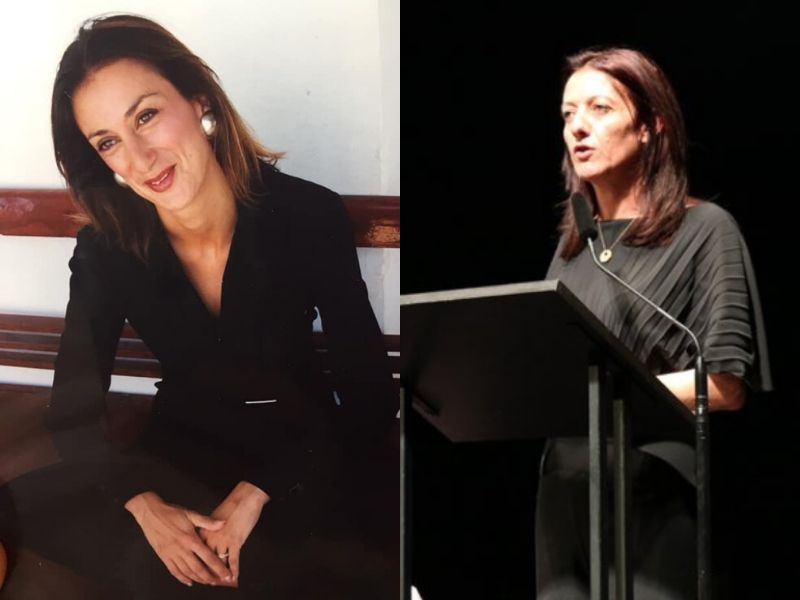Malta was one of the few countries where State-sponsored trolling was proven and continued unchecked through the Labour Party’s online hatred Facebook groups against murdered journalist Daphne Caruana Galizia, The Shift founder Caroline Muscat said.
With memberships in these groups running into the tens of thousands of users, the online hatred campaign focusing on Caruana Galizia was still active two years after her death and also targetted Opposition MPs, journalists, government critics and activists.
Muscat presented her research during her testimony in the ongoing public inquiry that was set up to investigate whether the murder of Caruana Galizia, who was killed in a car bomb in October 2017, could have been avoided.
Asked about her friendship with Caruana Galizia, Muscat told the Board that things changed after Labour won the 2017 elections.
“We were all in shock. There were leaks of corruption; it was such a moment of turmoil and then Daphne’s tone had changed. She became doubtful. In the days before she was killed, we were having a conversation on Whatsapp and decided to meet the following week for lunch. She told me that she had the feeling that time was running out.. it was not something she would normally say.”
She explained how she set up The Shift three weeks after Caruana Galizia’s death and became intensely aware of the online hatred campaign faced by the journalist when alive. This led to a six-month investigation in secret and closed groups on Facebook to understand the “hate cycle”, which revealed that the online discourse in Malta was becoming increasingly polarised and abrasive.
Muscat explained that the discourse in these groups revolved around online harassment and disinformation with politicians and government officials also using the social media platform to disintermediate the press and change the narrative.
The groups also revealed a high degree of control and coordination as the instances of mass trolling and blatant online threats became more frequent.
Death by dehumanisation
Muscat pointed out that these groups continued their dehumanisation campaign even after Caruana Galizia’s murder while discrediting government critics such as the Daphne Project, local journalists and activists, and Opposition MPs.
This was also perpetrated by government officials and politicians. Rosianne Cutajar, now Parliamentary Secretary for Equality and Reforms, called Caruana Galizia a “hate-monger” and described her son’s call for justice as “embarrassing”. She was among those who justified the government decision to constantly clear the protest memorial set up at Great Siege Square in Valletta.
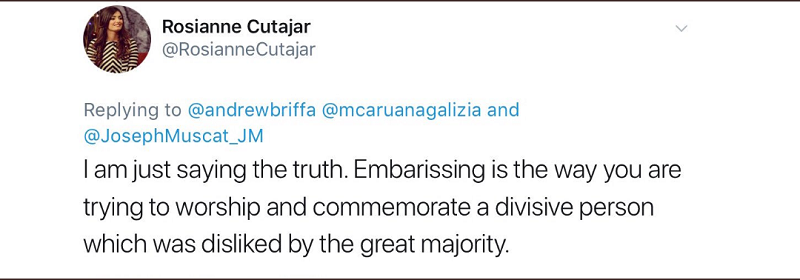
The decision, taken by Education Minister Owen Bonnici, to remove the items recently came under fire by a constitutional court that found it breached the protesters’ right to freedom of expression.
Former General Workers Union secretary general Tony Zarb, now a government consultant, and Malta Council for Science and Technology chairman Jeffrey Pullicino Orlando were also among those who continued perpetuating the hatred.
“What set the PL groups apart – besides the sheer size – and which made them focus of The Shift’s reports, were the involvement of government officials and public service employees in actively administering and moderating the groups including screening members for PL membership and curating content by removing critical views,” Muscat wrote in the dossier presented to the Board.
Ministers, Parliamentary Secretaries and even the President were members. The larger groups changed the composition of administrators and moderators in times of elections or disquiet showing a high degree of control and co-ordination. The high proportion of “hyper-partisan and abrasive content” in the groups, at times, verged onto potential criminal offences ranging from hate speech to trading in influence.
“These groups celebrated Caruana Galizia’s assassination, with calls for street parties and people to attend wearing red. Posts said, ‘karma is a bitch’ and ‘she can’t even rest in peace because she’s in pieces’,” Muscat told the court.
Online harassment
Aside from Zarb and Pullicino Orlando, the government officials who participated in online harassment were Office of the Prime Minister communications official Josef Caruana, former deputy chief of staff Mark Farrugia, government consultant Robert Musumeci, former OPM official Neville Gafa and Labour MP Glenn Bedingfield.
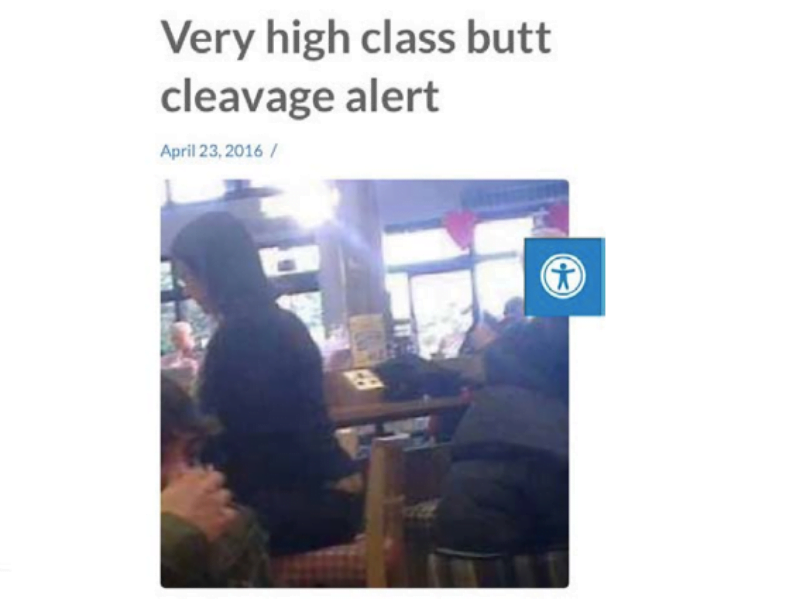
A blog post by Labour MP Glenn Bedingfield.
The investigation revealed that the groups were administered by Labour candidates and staff at ministries, including the Justice Ministry. The government had denied that they were hate groups a defended them on the grounds of “freedom of expression”.
Muscat described some of the posts as “particularly shocking” and said that this type of behaviour from government officials encouraged Party supporters to do the same.
“It makes the unacceptable acceptable, with the result that we see far more aggressive language and lack of tolerance for diverse views online,” Muscat noted in her report.
According to Bloomberg, Malta should be included in a list of countries where State sponsored trolling takes place due to:
- Past instances of threats and harassment of journalists, activists or even mere critics,
the involvement of senior government officials; - A marked blurring between political propagandists and government functionaries (State / Party separation);
- Facebook groups involved in trolling / harassment being administered or moderated by public officers, and lack of official condemnation and enforcement of appropriate laws.
Disinformation
Muscat’s report highlighted how the personal accounts of government officials and the Facebook groups were used with “alarming frequency” to flood online channels with competing narratives, often blatantly untrue, or designed to trigger an emotional response.
“This affects every subject debated, from immigration to the economy (with use of false statistics), and works against press revelations related to government behaviour,” she said.
The investigation revealed that the online groups were used to manipulate online polls in the government’s favour, co-ordinate online ‘mobbings’ on critics, drive coordinated cycles that manipulate the news.
A disinformation campaign titled the Truth Project was also designed to counter revelations by the Daphne Project one year after Caruana Galizia’s assassination.
From Facebook groups, the information is then spun by the Labour Party media, the national broadcaster TVM, then mainstream media for example on Malta Today, reproducing the narrative from different angles and platforms, she said.
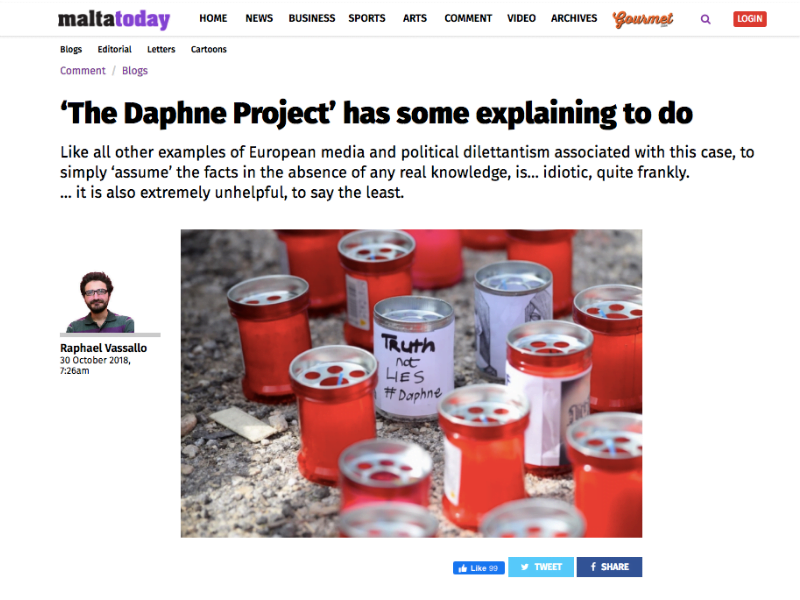
Screenshot of Malta Today article following the cycle of spin on The Daphne Project.
The EU was also giving more attention to the threat of disinformation to democracy, because of its ability to distort the right to freedom of expression and the public’s right to know.
The current media landscape
Muscat provided the inquiry board with some examples of her personal experiences in the current media landscape. The derogatory title of “saħħara tal-Bidnija” (the Bidnjia witch), which was used to refer to Caruana Galizia throughout her career, was changed to “saħħara tax-Xemxija” ( the Xemxija witch), referring to Muscat.
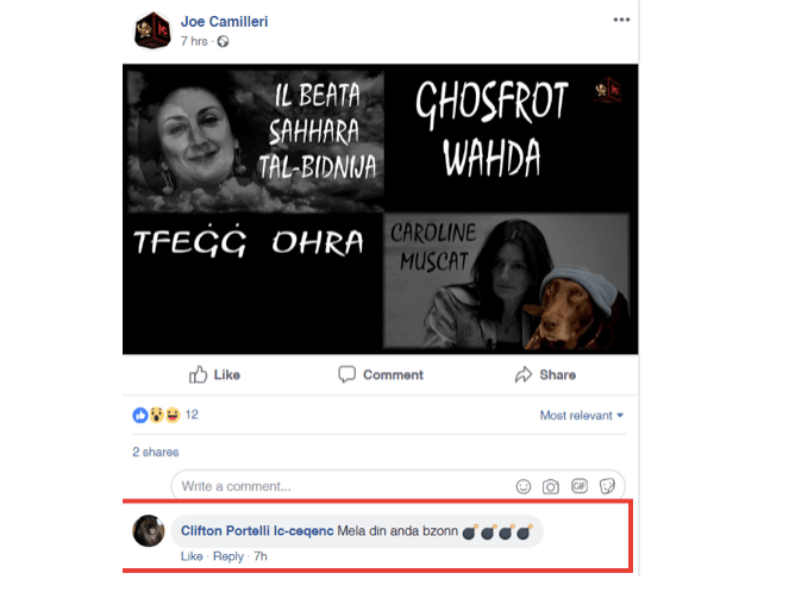
A meme on an online group saying “one vanished, another one appears” with a government employee saying Caroline Muscat deserved a few bombs too.
She also highlighted her struggle with obtaining access to the government and official events and being denied information after refusing to register The Shift with the Department of Information on the basis that the DOI’s decision breached the law. This issue has been highlighted by the Council of Europe and creates a situation where Muscat faces difficulty obtaining an official calendar of press events.
Muscat’s report also listed the cyberattacks on The Shift as well as the campaign to discredit it by Bedingfield and Caruana, which resulted in a Council of Europe press freedom alert.
Recommendations to improve the media landscape
“Every time we publish an investigation on which the police don’t act, we are made more vulnerable,” Muscat said.
She presented the Board with the following recommendations:
- Address the lack of independence of the media – abolish political party media.
- Put a legal framework into place that protects journalists from physical and legal abuse, so they can contribute to public debate effectively and without fear, including fear from SLAPP suits.
- State officials and public figures should not undermine or attack the integrity of journalists and other media actors.
- Protect the right to receive information, which embraces a right of access to information.
- Press cards and access to government – the government cannot decide who is a journalist or select which journalists can cover government events, functions and speeches.
- The independence of institutions meant to hold government in check must be prioritised – weak rule of law makes journalists more vulnerable.
- Law enforcement – police must act following media reports and allegations.
“It is alarming and unacceptable that journalists are increasingly being threatened, harassed, and even killed because of their investigative work or opinions, particularly when their work focuses on the misuse of power, corruption, human rights violations”, Muscat said in her report.
Things must change. The Maltese government’s record on freedom of expression showed that it has become the single greatest threat to freedom of expression in Malta.
“We can’t bring Daphne back to life, but we can make sure that it never happens again,” she said.
Meanwhile, Newsbook journalist Monique Agius and photographer Miguela Xuereb took the stand after Muscat and spoke about an incident where journalists were locked in a room in Castille following a press conference in the early hours of 29 November 2019.
Agius described the event as “traumatic” and “psychological State violence”. She recalled how she asked the men under what legal basis they were being prevented from leaving, which was left unanswered.
She reported the incident to the police shortly afterwards and also sent them a video that she had taken while locked in the room. She said she was contacted again by the police two weeks ago asking her to resend the video as the WeTransfer link had expired.

